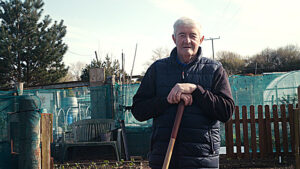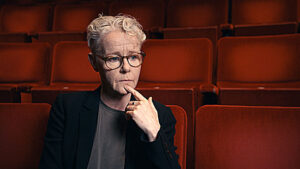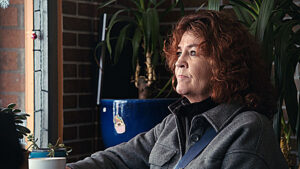
By David Hennessy
There will be a special screening of feature documentary Stolen by acclaimed Northern Irish director Margo Harkin as part of the Liverpool Irish Festival.
The film will be followed by a Q and A with the director. Ireland’s Special Advocate for survivors Patricia Carey will also join the discussion.
Released in 2023, Stolen explores the mother and baby homes scandal where the treatment of unmarried women who fell pregnant in 20th century Ireland sparked global outrage. A government inquiry unearthed shocking accounts of cruelty and abuse, including forced separations and adoptions, inhumane living conditions, children used as cheap labour and infant mortality rates up to five times the national average. In Stolen, survivors – including mothers and witnesses – speak out.
Stolen tells the story of how women who had the misfortune to fall pregnant ‘out of wedlock’ were treated in an Ireland that was heavily influenced by the Catholic Church.
Over 80,000 unmarried mothers were incarcerated in mother and baby institutions run by nuns from 1922 to 1998.
Most were cruelly separated from their babies after birth. Many of the children were adopted within Ireland and abroad – rendered untraceable and unaware of their birth story.
Others were fostered out as cheap farm labour from the age of six, often in circumstances abysmally devoid of care and love. 9,000 infants died in these institutions from 1922 to 1998, a rate that, on occasion, was five times the national average infant mortality rate.
In the film survivors reveal the shocking details of their treatment in a scandal that sparked a government inquiry into the fate of unmarried women who fell pregnant in 20th century Ireland.
It was a history that was largely ignored until a local historian, in the west of Ireland, recently discovered that 796 babies died between 1925 and 1961 in the Tuam Mother and Baby Home alone. Shockingly, there were no burial records. The public imagination was captured as suspicions grew that the tiny remains were buried in an underground sewage plant beneath a playground, on the site of the former home, beside a housing estate. When the clamour escalated over what happened in Tuam and other institutions around the island, the Irish government announced an inquiry into Mother and Baby and County Homes.
A vista of horror emerged over what happened at other so called ‘homes’ run by religious orders, such as Bessborough in Cork and Sean Ross Abbey in Tipperary. Thousands of babies died in these institutions.
The Irish World spoke to director Margo Harkins earlier this year ahead of a previous screening of the film.
Margo told us: “People think they know this issue.
“I think I thought I knew it.
“We’ve all seen the clickbait headlines about missing babies birth certificates in Tuam and then babies found in a septic tank.
“It wasn’t really a septic tank by the way, it was an underground sewage works that maybe had ever been used.
“They think they know it because they’ve read these headlines and bits of newspaper pieces but when you actually hear the real people who suffered and were the survivors of what happened to them, then it brings it home in a totally different way because you get the detail of the stories.
“I’ve left so much out, it’s unbelievable.
“Because you have to make it palatable to an audience and the length it is is quite long even for that.
“One of the big difficulties I had was that I actually had interviewed too many people because you get sent from one to the other and I just really wanted to include as many stories as I could, but when it came to the edit, I had too many.
“I knew as a filmmaker, it was too many but I couldn’t go back.
“I just couldn’t.
“Given the stories that were involved and the ethics involved I couldn’t go back to people and say…”
You didn’t make the cut.
“Yeah, but I was being put under that kind of pressure by both funders and the production team.
“The easiest way to cut would be to cut out whole people, whole interviews and that’s true but I couldn’t do it.
“So I just took an awful long time to do that because I just clipped and clipped and clipped and clipped and shaved and shaved so that everybody was in it but to a lesser degree.”

What first moved you to make this film? “Like everybody in Ireland and probably a lot of people in Britain as well, I was watching the story.
“We were watching this story as Catherine Corless was attacked from all quarters, especially from a very white right wing American Evangelical group.
“Some local people as well were denying that what she was saying was true.
“She just kept on with it.
“That was a lot of pressure on her, an awful lot of pressure.
“I was following it just like everybody else and I’m a filmmaker and I sort of wondered, ‘Is there something I could do about that?’
“Because you try to bring your talents, what you can to an issue if you think it concerns you enough, and you’re moved by it.
“I also have always had that thing, as a documentary maker, of giving people the right to speak, allowing their voices to be heard, and letting people speak who don’t ordinarily get to speak was kind of a big issue for me.
“But what really made it happen was the day that the Minister for Children and Youth Affairs Katherine Zappone announced in the Dáil that there was going to be a forensic examination of the Tuam site.
“They had already announced the inquiry in 2014 but in 2017, she said that they had done a preliminary forensic inquiry and they had found significant numbers of human remains.
“That was the moment really I thought, ‘Wow, Catherine Corless has been vindicated here, what she suspected has actually happened’.
“They found these remains under the surface of the playground at the Tuam site which had been the site of the former mother and baby home there.
“I thought, ‘There’s a story here now’.
“Originally I think I thought about making it just about Catherine Corless’ journey but was aware already from the interim reports coming out from the Commission of Inquiry that huge numbers of babies had died in other sites as well and nobody knew where their bodies were and still don’t know where their bodies are.
“I mean, it’s a huge scandal.
“More than 1,000 died in Sean Ross in Roscrea in Tipperary.
“So it was the fact that Katherine Zappone said that they had discovered evidence of a significant number of human remains at the site in Tuam that made me think, ‘I can do this’.
“I just tried to find people around who you may be attended different homes.
“We went all over Ireland: From Cork to Galway, to Newry, to Belfast, to Derry. Sean Ross Abbey in Roscrea in Tipperary
“We were everywhere.
“It is a widespread issue, a widespread scandal.”

It is poignant that what you do in the film, give people a chance to tell their story, is exactly what no one was interested in doing for so long. In fact they were silenced and ignored..
“People often say to me, ‘How do you get people to speak? How were they able to trust you?’
“And actually, it was an open door.
“Trust is an issue and it all depends how you’re referred to people.
“We were referred a lot by Caelainn Hogan who was a consultant on the film.
“She also reads from her book, Republic of Shame.
“She did put me in touch with a lot of people but the information came from other sources as well.
“Quite often you talk to one person, they’d refer you onto another person.
“We would talk to people and they had spoken a lot to press before and weren’t sure if they would do it again but they did once they kind of trusted our team and what we were doing, and trusted me in particular as the director.
“I did give them all assurances that I would not ever do anything that they were unhappy with.
“You can’t give people the right to be included in the edit of your film but you have to kind of make sure they understand that they can trust you.
“We did meet some people who wanted to tell their story but then they would say they couldn’t take part in the film because maybe their mother didn’t want it to be exposed in that way.
“Or maybe their mother had already contributed to several things that didn’t lead to anything and their hopes were dashed.
“I was very grateful that those people talked to me but they didn’t always have the capacity to say, ‘Yes, we’ll be in your film’ for one reason or another.
“Actually there are two women in the film who were reunited with their sons after 40 years, which is extraordinary and in a way those were relatively happy stories or happy outcomes at least.
“But those sons wouldn’t take part in the interview because their adoptive parents were still alive or one of them was still alive, and they were sensitive about them and didn’t want to hurt them.
“So there’s all sorts of reasons why people can take part and can’t take part but in large measure people really wanted to talk.
“They wanted their story out there.”

It may be a poignant screening it in the UK as so many survivors ending up coming to the UK..
“I’m very aware of it. Very, very aware.
“Actually we had a screening at the London Irish Centre in Camden.
“It was so well attended and the audience was very different in terms of the response.
“They were very audible.
“They oohed and aahed and gasped very audibly.
“Quite often I find our audience is very silent for the film.
“Not in London.
“They just were making sounds all the way through, it was an amazing kind of screening for me to listen to.
“Everybody you talk to knows somebody or actually has a relative who has been through this experience, it is very widespread.
“And you’re quite right that a lot of people went to England, and some of them fled.
“They just couldn’t wait to get away and never wanted to go back.
“So it’s very sad that we did that as a country, that our government and the influence of the church had such an impact and affected people in that way.
“It’s a scandal.”

A surprise for me watching the film was that one woman got away to London. Knowing she was pregnant she got the boat only for the authorities to drag her back on a plane.
“She was kidnapped. I couldn’t believe it.
“I actually wondered, ‘Is this true?’
“I really wondered about it but it was true.
“In the end, we saw the documentation.
“She was known as a PFI: Pregnant from Ireland.
“That’s just crazy that these things happened: That they actually sent people in to hospitals to find people who were from Ireland.
“Had that not happened to her, she could have had her child in England and stayed there and had a life with him.
“None of that happened it was all prevented because of the Catholic Church.
“She did say to me since I did the interview that she believed her aunt (who she went to stay with in London) was complicit.
“The fact that this priest came and bullied her onto the plane.
“It was horrendous.
“It’s hard to believe that that could have happened but the whole thrust was about keeping Catholic babies back in Ireland, making sure their faith was honoured, such rubbish.
“She had such a dreadful outcome to her story because her son never wants to see or meet her.
“They don’t always work out.”

There is also another interview subject whose birth mother couldn’t look at her.
“Colleen Anderson. She was adopted to America.
“Colleen’s story is very sad.
“It’s very sad because her family in Ireland don’t acknowledge her anymore.
“They did for a while but a newspaper printed the name of her mother: So inconsiderate, not thinking about the impact that this has on people.
“They (the family) just had nothing more to do with her.
“And she was tortured most of her young life.
“Quite a lot of people were abused physically, like Michael O’Flaherty.
“He was abused very badly.
“He told a lot of stories which I couldn’t put in the film where he had the life thrashed out of him.”

Women being dragged back from England is something but even being lifted from their own homes by gardai sometimes with a priest and/ or a doctor is crazy. These women had committed no crime so how were guards involved?
“Absolutely, they had just committed a moral crime in the eyes of the church.
“The level of shame was just astronomical, the way they were looked down on and the way families were made to feel that this was a shame that beset their family.
“Quite often families would have gone to the church to know what to do for guidance because that’s the way Ireland was.
“That’s a scandal, the fact that these women had committed no crime.
“It’s just the judgement that was meted out to woman was just so ridiculous.”
There’s one woman in the film who tells the priest or whoever comes to her door to ‘f**k right off’. Was there more of that?
“No, that was just when the times were changing.
“That was the beginning of the change.
“Before that, it didn’t happen.
“Women were so economically unable to survive in a society which didn’t support them if they were not married, that often made the decisions for them.
“There wasn’t more people saying it because they it would have made trouble for themselves.
“They were definitely not able to break free of the constraints that were operating at that time.
“They were very, very serious.”

Margo makes mention of cases such as Joanne Hayes and Ann Lovett and how the boyfriend of one of them was spirited away to Scotland to join the army by the church.
“I think men have a lot to answer in terms of how they behaved in the situation.
“Seeing that story, you realise how controlling the church was when none of these situations were black and white.”
As it is said in the film there were 796 babies which means there was also 796 fathers..
“.. Who abandoned responsibility, or were made to abandon responsibility.
“I would love men to start talking.
“There’s a lot more to be told.”
The title is a good one because yes, babies were stolen but so were lives, families, memories..
“Absolutely right.
“We felt it encompassed a lot of that.
“To me these people are warriors because they just keep on fighting.
“I just think the government’s been despicable really in terms of how it’s treated them.
“Enda Kenny makes a great speech in the film. I was amazed when I heard him say that but it didn’t translate into action.
“I think once the civil servants get on top of it, it becomes a monetary equation, ‘What is this worth? What can we afford for this?’
“And they’re being treated really badly.
“I just want more people to know about it and to support them and maybe try to help them get a better deal from government because they’re not getting it at the minute.”
Katherine Zappone features in the film, of course she has since been succeeded by Roderic O’Gorman..
“People had a lot of hope for him but he’s turned out to be just as bad.
“He’s the one that’s kind of made the rules about the redress people and it’s pathetic: Rules you have to be in a home for more than six months. It cuts out loads of people, it’s a completely arbitrary figure, doesn’t make any sense, doesn’t address the central issue: The separation of mother and child. That’s where the pain occurred, that their lives were transformed at that minute in a very negative way.
“People that I speak to are very upset and angry about everything that’s gone on about the inquiry itself, how it was conducted and then by the outcomes of it.
“People ask me, How did I cope with it?
“I didn’t suffer. I keep saying to people I didn’t personally suffer as a result of listening to these stories.
“I just wanted to help people to get them out.
“I hope I’ve done some measure of justice to their stories even though you know you’re only scraping the surface.”
Stolen screens 2pm on Saturday 2 November at Bluecoat on School Lane as part of Liverpool Irish Festival. The screen with be followed by discussion with director Margo Harkin and Patricia Carey, Ireland’s special advocate for survivors.
Former residents of Ireland’s mother and baby and county homes may be entitled to a general payment, a work related payment and health related payment, depending on circumstances. They can also access help with tracing their birth and early life records, finding family members and specialist counselling support through Renewing Roots. More information by clicking here.


